- Author Jason Gerald gerald@how-what-advice.com.
- Public 2023-12-16 10:50.
- Last modified 2025-01-23 12:04.
Sometimes, it is difficult to determine whether it is best to ask for leave from school/work when you are sick. On the one hand, you may not feel well and don't want to pass the disease on to other people. However, on the other hand, there are many tasks that you have to complete. To help make decisions, it is important to recognize the signs of an infectious disease and understand the health guidelines provided by government institutions and health care organizations. If in the end you decide to continue to attend school/work while experiencing a contagious disease, there are several preventive measures that can be taken to minimize the transmission of the disease to others.
Step
Part 1 of 3: Recognizing the Symptoms of Infectious Diseases
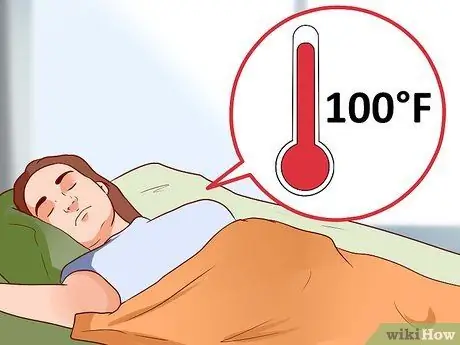
Step 1. Rest in bed if you have a fever
If your body temperature is over 38 degrees Celsius, rest at home and don't go to school/work until your body temperature has returned to normal (37 degrees Celsius) for 24 hours, which doesn't apply if your normal body temperature is reached due to taking medication because it means you're still sick and can transmit the disease to others.
- Infants who have a fever of 38 degrees Celsius or more should be taken to the emergency department immediately.
- A high fever may also be accompanied by a period of sweating and chills.

Step 2. Rest at home if you have a severe cough
A cough that feels like it's coming from inside the lungs can be a sign of a serious infection. Don't go to school/work and call your doctor to see if your cough requires further testing.
- A mild cough is often experienced when you have a cold or allergies. A stuffy and runny nose and sneezing are also possible. If you want and no other symptoms occur, you can carry out your activities as usual.
- Cover your mouth when coughing and wash your hands frequently. Both ways help prevent the spread of germs.
- If you experience shortness of breath when coughing, go to the emergency department immediately for medical assistance.
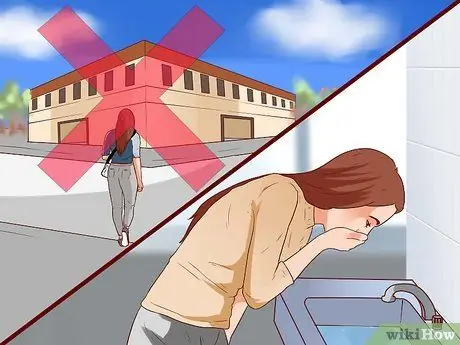
Step 3. Do not go to school/work if vomiting occurs
Avoid people until you are no longer vomiting and the doctor says you can go back to school/work so that the disease is not contagious.
- Take care of the body by drinking plenty of fluids. If you vomit after drinking a glass of water, try sucking on an ice cube. This method allows the body to get water slowly so it is not likely to cause vomiting.
- If you're still vomiting and are at high risk of severe dehydration, go to the emergency department. If needed, you will be hydrated with fluids through an IV. Symptoms of dehydration include weakness, dizziness, infrequent urination, dark or cloudy urine, and no tears when crying.

Step 4. Get sick if you have diarrhea
Stool that is too soft or watery is often a sign of infection. Don't stay away from the bathroom and don't go to school/work until your body condition improves.
- Diarrhea caused by food or drugs is not contagious. In that case, you don't need to rest at home if you feel well enough to carry on with your normal activities.
- In all cases of diarrhea, the body is likely to lose a lot of water. So, it is important to maintain normal levels of water in the body by drinking lots of water. Drink even when you don't feel thirsty.
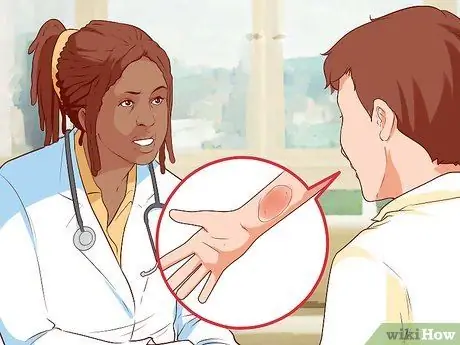
Step 5. Rest at home and see a doctor if a rash occurs
If you develop a rash with open sores that ooze or expand rapidly, see a doctor immediately. Do not go to school/work until the doctor confirms the disease is not contagious.
- Allergic rashes are not contagious. If your symptoms are controlled enough that your ability to think and concentrate is not impaired, you can go to school/work.
- In mild cases of rash, you may still be able to attend school/work if the rash is covered. Consult your doctor or school nurse to be sure.
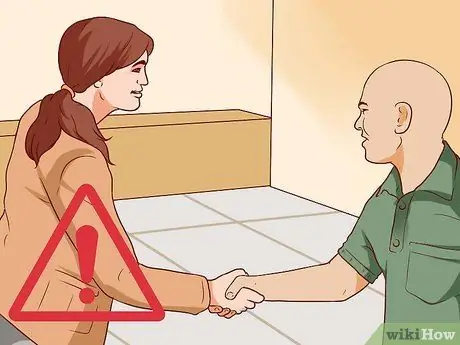
Step 6. Prevent spreading the cold to others
Resting at home may not be necessary if you just have a cold. If the pain is not so severe that you have to rest at home, there are some simple precautions you can take to prevent the spread of the disease, including:
- Wash your hands often
- Don't hug or shake hands
- Do not share food or drink with others
- Turn your face away and cover it with your elbow when you sneeze or cough
- Use a tissue to wipe a runny nose
Part 2 of 3: Complying with Regulations on Common Children's Diseases
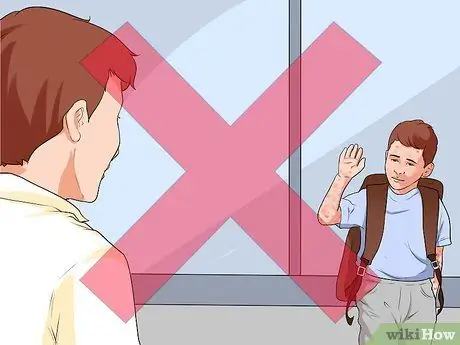
Step 1. Children should not attend school when they have a vaccine-preventable disease
If a sick child is around other children who have not been vaccinated or have compromised immune systems, the spread of the disease is likely. Wait until the doctor says your child is healthy enough to go back to school. The diseases in question include:
- Measles. This disease is characterized by red spots accompanied by cold-like symptoms. Patients can be infectious from 4 days before the rash appears and during the first 4 days the rash appears. Wait until the doctor gives approval before allowing the child to return to school.
- parotitis. This disease is characterized by swelling of the salivary glands and flu-like symptoms. Follow doctor and school instructions about how long your child should rest at home.
- Rubella. This disease is a pink rash and flu-like symptoms. If it occurs in pregnant women, this disease can cause birth defects in the fetus. Talk to your doctor and school nurse about when your child can return to school.
- Pertussis (whooping cough). The disease is characterized by flu-like and cold-like symptoms and a severe cough that can cause difficulty breathing. Consult the doctor and school nurse to find out how long the child should rest at home.
- Chicken pox. This disease is characterized by a raised red rash filled with fluid and flu-like symptoms. Patients can transmit this disease from 2 days before the rash appears until after all the rashes have dried. Talk to your doctor about when your child can return to school.
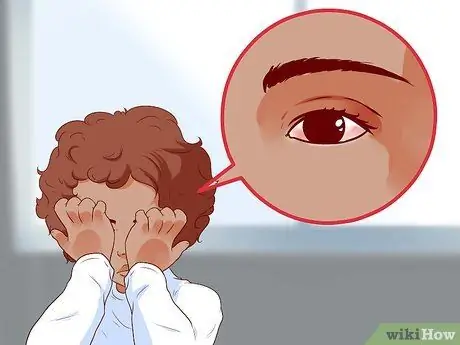
Step 2. The child should not go to school if he has pink eye
Pink eye, also known as conjunctivitis, is an infection that causes the eye to turn red and produce a greenish-yellow sticky mucus.
- Because the eyes may feel itchy, children often rub their eyes, then touch friends or shared toys so that this disease is very easy to spread.
- After treatment, the child can return to school if the doctor has declared the condition of the disease can no longer be transmitted to others.
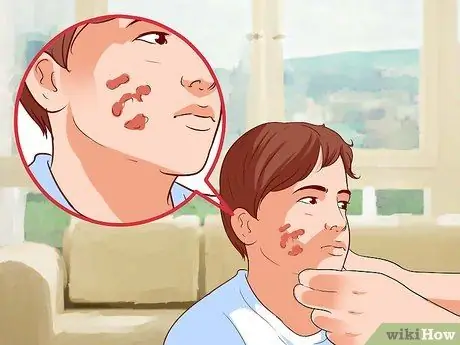
Step 3. The child may not attend school for one day after being diagnosed with impetigo
However, after receiving treatment according to the doctor's instructions, the child may be able to return to school, unless advised otherwise by the doctor.
- Impetigo is an infection that causes the formation of pustules (fluid-filled blisters). Pustules may ooze and dry out. The pustule area should be covered while in school.
- Impetigo can be caused by streptococci, staphylococci, and MRSA infections.
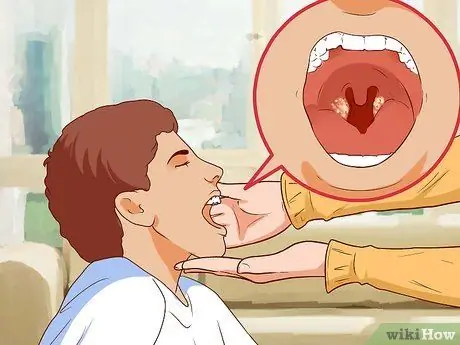
Step 4. It is recommended that your child rest at home if he has strep throat
This disease is characterized by inflammation of the throat. Check with the doctor because antibiotics may be needed.
- Your child may feel well enough to return to school after 24 hours of antibiotic treatment.
- Consult a doctor to be sure.
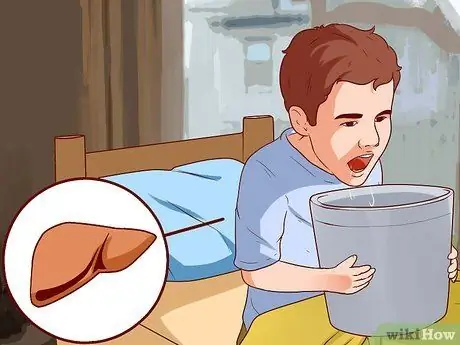
Step 5. The child may not attend school for one week while having hepatitis A
Hepatitis A is a highly contagious liver infection that causes nausea, vomiting, pain in the liver area, joint pain, dark urine, light-colored stools, and yellow eyes and skin. If you suspect your child has hepatitis A, consult a doctor immediately.
If it takes your child more than a week to feel better, allow your child to rest at home longer
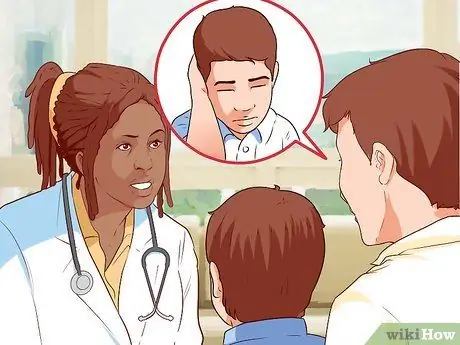
Step 6. See a doctor if your child has ear pain or fluid is flowing out of the ear
If the pain is caused by an infection, antibiotics may be needed.
- Your child may not be able to concentrate or study properly until the ear no longer hurts. Allow the child to rest at home until he feels better.
- Ear pain can be caused by a bacterial or viral infection. If left untreated, ear infections can lead to hearing loss/impairment.
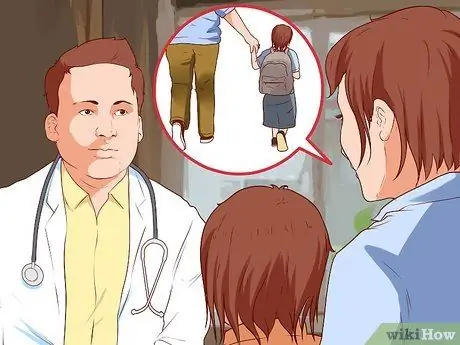
Step 7. In other types of infection, the child can return to school after treatment is started
Consult the pediatrician and school nurse. Your child may still be able to attend school or be placed in daycare if you have any of the following common infections:
- Scabies. This disease is caused by mites that enter the skin and lay eggs, causing red bumps and grooves under the skin and feel very itchy. This disease is highly contagious. Check with your doctor to get a prescription for medicine that can cure this infection.
- Lice. Head lice are insects that live and lay eggs on human hair. Head lice cause itching, but are not dangerous. Sticky nits should be removed carefully using a fine-toothed comb. If necessary, keep your child out of school for a day or two so that you have enough time to provide treatment. Anti-lice shampoos that can be purchased without a prescription or with a prescription are available at pharmacies.
- Ringworm. Ringworm is a fungal infection that causes a red, circular rash. Check with your child's doctor to determine whether antifungal drugs need to be used. Body parts that have ringworm must be covered while at school.
- Fifth disease. The disease causes flu-like symptoms and, when nearly cured, a red rash that often appears on the face and other parts of the body. Because the rash often appears on the cheeks, it is also known as slapped cheek disease. Once the rash appears, the disease may no longer be contagious. Immediately consult a doctor if your child has sickle cell anemia or an immune system disorder. Fifth disease is also harmful to the fetus if exposed.
- Diseases of the hands, feet and mouth. This disease causes painful blisters in the mouth and red rashes on the hands and feet. Fever and sore throat may also occur. If the child's saliva continues to flow and there are blisters in the mouth, the child should rest at home.
Part 3 of 3: Preventing Disease Transmission

Step 1. Keep your distance from other people when you are sick
If you have to go to school/work when you are sick, minimize the chance of transmitting the disease by keeping your distance from other people, for example by:
- Don't hug. If necessary, decline the hug by explaining that you are sick and do not want to spread the disease. Most likely people will agree that you are keeping your distance.
- Do not approach people while talking or look at the computer screen over the other person's shoulder.
- Wear a mask so you don't blow your breath on other people.
- As much as possible, don't shake hands.
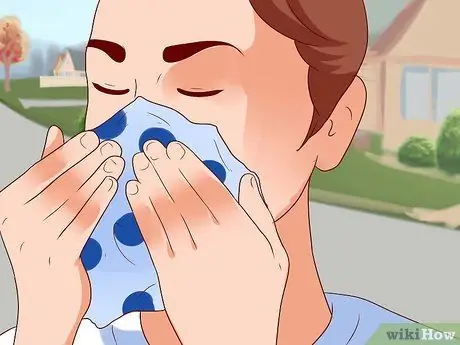
Step 2. Cover your mouth when you cough or sneeze
This method prevents small drops of germicidal liquid from being splashed onto other people or on common objects that are touched by many people.
- Cover your mouth with a tissue and throw it away after coughing/sneezing. Even though it may look clean, you just sprayed germs on the tissue.
- If you don't have a tissue, sneeze/cough into your elbows, not your hands. Even if germs are spread on clothing, compared to hands, elbows are less likely to come into contact with other people or common surfaces.
- If your cough/sneeze is uncontrollable, wear a mask.
- Wipe common surfaces you touch with a wet tissue, including desks, computer keyboards, and door handles.

Step 3. Wash your hands thoroughly frequently
Wash your hands properly before preparing food, after urinating, blowing your nose, sneezing or coughing, and before caring for or touching other people. The Centers for Disease Control and Prevention (CDC) recommends the following steps for proper hand washing:
- Wash hands with running water. Turn off the tap to save water.
- Soap both hands. The entire hand, including the back of the hand, between the fingers, and under the nails, should be coated with soap.
- Rub both hands thoroughly for at least 20 seconds.
- Rinse all soap and germs with clean water.
- Let your hands dry on their own or dry them with a clean towel. Drying your hands with a dirty towel makes washing your hands useless!
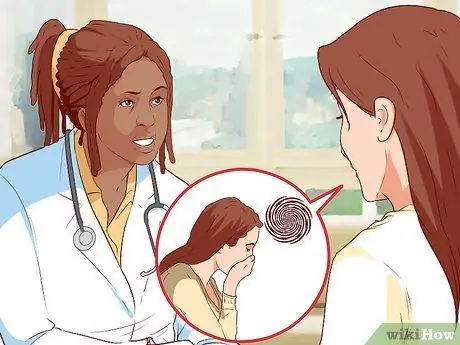
Step 4. See a doctor for signs of serious complications or infection
If you or your child experience any of the following symptoms, see a doctor immediately:
- Hard to breathe
- Breath hunting
- Blue hue on the skin
- Dehydration
- Unable to wake up or not responding
- Feeling very irritated
- Fever. In infants and young children, see a doctor even if the fever is only 38 degrees Celsius, or if the newborn has a lower than normal body temperature.
- Fever for more than 3 days
- Fever with rash
- Flu-like symptoms that heal, then recur again accompanied by fever and severe cough
- Dehydration
- Stomach or chest pain
- Feelings of pressure in the stomach or chest
- Dizzy
- Confused
- Severe vomiting
- Sluggish
- Severe headache or throat
Warning
- Follow the doctor's instructions regarding the consumption of drugs.
- Consult your doctor first before taking any medical or home remedies if you are pregnant, or before giving medication to your child.
- If you are taking medication, consult your doctor before getting additional medications, even if they are over-the-counter medications or home remedies, as certain medications can interact with each other.
- If there is a population in the school/workplace that is prone to contracting the disease, it is very important to rest at home when they are sick. Populations that are vulnerable to contracting the disease include children, the elderly, and people with compromised immune systems or other health problems.






